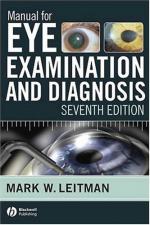|
This section contains 858 words (approx. 3 pages at 300 words per page) |

|
An eye examination is a series of tests that measure a person's ocular health and visual status, to detect abnormalities in the visual system, and to determine how well the person can see. It is performed by an ophthalmologist (M.D. or D.O.--doctor of osteopathy) or an optometrist (O.D.) to determine if there are any pre-existing or potential vision problems. Eye exams may also reveal the presence of many non-eye diseases. The frequency of eye exams differs with age and the health of the person. Eye exams can be performed in infants, and if a problem is noted the infant can be seen by a pediatric ophthalmologist. A child with no symptoms should have an eye exam at age three. Early exams are important because permanent decreases in vision (e.g., amblyopia, also called lazy eye) can occur if not treated early (usually...
|
This section contains 858 words (approx. 3 pages at 300 words per page) |

|


